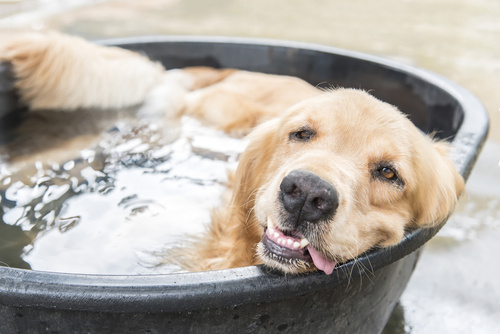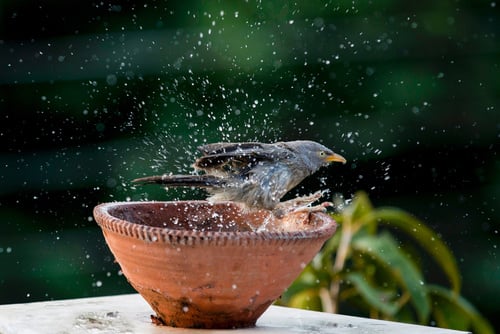- All products are added to your cart.
How can you cool down your pet on hot days?
In the heat, you need to take care of yourself, but your pets also require extra attention. It should be clear by now that leaving a dog in the car is not acceptable. Unfortunately, this still happens. People often underestimate how quickly the temperature inside a car can rise, even in the shade or with the window slightly open.
However, leaving them in the car is not the only way your pet can overheat. Animals generally can't tolerate heat very well, so here are some cooling tips. And not just for dogs, but also for other pets, as overheating can be deadly for them too.
-
Too warm
Some people find it difficult to assess when an animal is too hot. However, there are signs to watch out for. The mucous membranes are red, the animal feels hot, and it breathes rapidly. They often refuse to eat and are lethargic. In dogs, overheating can also cause vomiting.
For birds, they often sit with their feathers spread out and their beak open.
-
What can you do?
Fortunately, there are ways to help your pets when it's too hot. Ensure they have a cool place to lie down and provide fresh drinking water. You can wet dogs, cats, rabbits, and rodents. Focus on wetting their head, ears, neck, and paws.
However, avoid using ice-cold water for this purpose. The sudden temperature difference can cause shock and even death. It also causes blood vessels to constrict, making it even more difficult for them to release heat.
-
Heatstroke
Is the overheating severe? Your pet may experience heatstroke. This is characterized by a rapid heart rate and breathing. They may also show little to no response to stimuli. In such cases, you must immediately call the veterinarian and start cooling them down!
· Dogs
Dogs can only dissipate heat through panting. Additionally, they only have sweat glands in their paw pads. Make sure your dog has a place in the shade during hot weather. Also, providing plenty of fresh drinking water is crucial.
As mentioned, cooling down can be challenging for dogs. Therefore, here are a few tips:
- If you have space for a paddling pool for your dog, that's fantastic. Even if they don't swim, just standing in the water can help a lot.
- There are special cooling products available for dogs, such as cooling mats or collars. However, make sure your dog doesn't chew on them.
- Dogs can also get sunburned, especially if they have a thin coat. It's a good idea to apply sunscreen to them.
- Avoid long walks in the heat, and definitely do NOT cycle during the day. Do these activities early in the morning or late in the evening when it's cooler.
- Never leave your dog in the car. The temperature inside can rise to 50 to 70 degrees Celsius within 10 minutes, even if your car is parked in the shade with the window open.

· Cats
Cats often seek out a cool spot on their own when they get too warm. Make sure your cat has access to shade or can come indoors. Sufficient drinking water is also essential for them. If you need to take your cat to the vet, you may have to transport them in a warm car. In such cases, be alert to signs of overheating.
· Rabbits
Rabbits are not well-equipped to handle heat. They are naturally accustomed to living in cool burrows underground. They start to struggle even at temperatures around 24 degrees Celsius. Therefore, ensure that the rabbit hutch is not in direct sunlight.
You can also provide additional cooling by placing cool elements in the hutch. This can be done easily by filling plastic bottles two-thirds full with water and freezing them. Once frozen, place them in the hutch to provide cooling for your rabbit. You can wrap them in a cloth if needed, but be careful to prevent the rabbit from chewing on the bottle.
To cool down the outdoor hutch, you can cover it with a damp white sheet.
· Myiasis
During warm weather, rabbits often die from flystrike, a condition caused by the green bottle fly. These flies lay their eggs in soiled fur or feces.
The maggots from the fly can cause blood poisoning. Without prompt treatment from a veterinarian, a rabbit or chicken can die within two days. Therefore, it's important to maintain good hygiene for your rabbit and clean the hutch more frequently. You can use VirkonS for this purpose, as this disinfectant is highly effective against various viruses, bacteria, and fungi.
· Rodents
Small rodents like guinea pigs, hamsters, and rats can also get very warm. Help these animals cool down, similar to rabbits, by using frozen water bottles or cold stones. If the cage has a plastic base, you can place it on a few frozen gel packs. And as with rabbits, NEVER place this cage in direct sunlight.
· Birds
Bird cages should absolutely not be placed in direct sunlight. For birds that enjoy bathing, provide fresh water more frequently. Keep in mind that heat rises, so if you have a hanging birdcage, it's better to place it on the ground during hot weather.

Be cautious of drafts as well, as they are also not good for birds. If you have dogs, cats, or small children alongside a bird, the bird may experience stress, especially in its new position on the ground. Create shade in an outdoor aviary or chicken coop with a parasol or a damp white sheet.
Of course, you can also make a difference for wild birds. For instance, set up a bird bath in your front yard. This can be as simple as a flowerpot filled with water or a wider dish.
---
Image sources:
APIWICH PUDSUMRAN/shutterstock.com
Studio Photo bird/shutterstock.com


